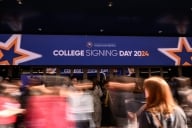You have /5 articles left.
Sign up for a free account or log in.
Deidra Faye Jackson earned her Ph.D. in higher education from the University of Mississippi at Oxford. She is the interim director of the UM Tupelo Campus Writing Center and teaches in the departments of writing and rhetoric and higher education. You can find her on Twitter at @DeidraJackson11.
Did you hear about these two University of Virginia grad students who rescued a long-standing academic relic from imminent destruction? Their institution’s expansive and outdated library card catalog -- which enjoyed a heyday as a bona fide workhorse before it was decommissioned 31 years ago -- grew to consume an unwieldy 68 cabinets’ worth of space. When it was determined that digital archiving would be too costly, Neal Curtis and Sam Lemley, both Ph.D. candidates in literature, devised a more economical storage option to allow future researchers and historians to access the rich low-tech data that otherwise would have been destroyed.
In the article by Lilah Burke, the doctoral students said they weren’t motivated by nostalgia but by the chance to augment future historical research. They want to preserve the more than four million cards because of their unique potential to be extraordinary documents of the university’s history.
That distinction underscores the pedagogical benefits of (more) unplugged learning for our students. In other words, choosing low- or no-tech student learning engagements can be advantageous, not simply because we think they’re better or more reliable in some way, but because they may yield different desirable results. And in some ways, high tech may not implicitly be better for learning. This 2017 article illustrates that researchers are still a bit clueless as to whether students comprehend complex text better in digital or print form.
Back at UVA, imagine the historical paper trails and artifacts that those old thumbed-through library cards might yield. Consider the critical thinking and collaboration skills that students could employ when having to draw connections between library holdings and emerging milestones in the school’s history; there could be some fascinating discoveries waiting to be found. That type of old-school research has always been pioneering, even if we might not consider the methods to fit our definitions of “innovative” today.
Our students may benefit academically when they engage in such low-tech undertakings. The UVA grad students’ ingenuity has me reconsidering my requirement that first-year writing students physically check out library books and include them among their research references. Maybe it’s not enough for budding researchers to simply check out a book when knowing how to fully navigate their academic library for their own unique research purposes would serve them better.
While it’s routine for some of us instructors to permit students to cite reputable online sources, we may assume they know at least how to check out a book or generally know their way around their academic libraries. But what might students learn along their own journeys to information? With call numbers in hand, additional learning opportunities abound in the moments before students approach their target stacks.
For instance, undergraduates can devise their own specialized library tours and map out favored paths and areas of interest to their peers; they may investigate relevant library resources and holdings other than books that benefit their inquiries; students can examine related texts nearby; and, most importantly, they can connect with knowledgeable reference librarians, who might help them further advance their studies, to name just a few worthwhile academic tasks. Other Gradhackers have written about the virtues of academic libraries (and librarians) here, here and here.
As a former journalist who loves the smell of newsprint and forever memorializes that scene in the 1976 film All the Presidents’ Men, which depicted Washington Post reporters Bob Woodward and Carl Bernstein painstakingly searching through records inside the Library of Congress, I know that today’s technology would have streamlined most of their tasks, reducing such searches to mere instants (that previous link leads to a blog about librarians in film as written by real librarians!). However, as the movie illustrated, even the most innovative technology of the time could not replace the critical thinking (and people) skills that the reporters lent to their extensive and consequential work.
The ingenuity demonstrated by these UVA grad students and other hardworking grad students always amazes me. But imagining student researchers for years to come meticulously examining documents to uncover fruitful quantitative and qualitative research data should inspire us to consider the benefits of unplugged classrooms: How might we integrate more effective low- to no-tech creative solutions to better teach our students? As we reconsider ways to improve comprehension and retention and encourage student engagement and critical thinking, turning away from even the most advantageous social media and digital devices in academia, if only sometimes, may prove rewarding in the long run.
What are your experiences in unplugged academia? Is it impossible to “keep it old school” within today’s leading pedagogy? Share your thoughts in the comments or on Twitter!
[Photo by Brad Neathery on Unsplash.]








